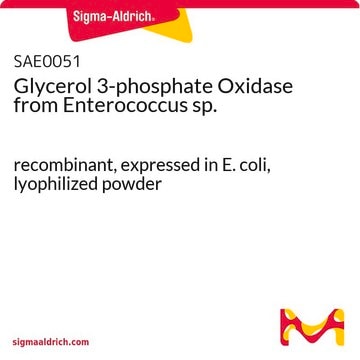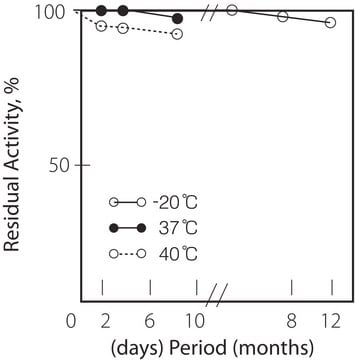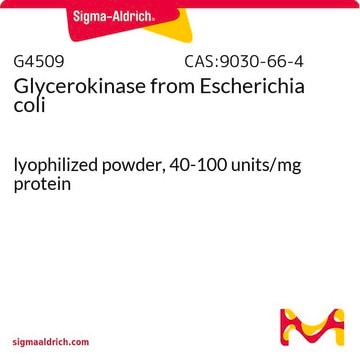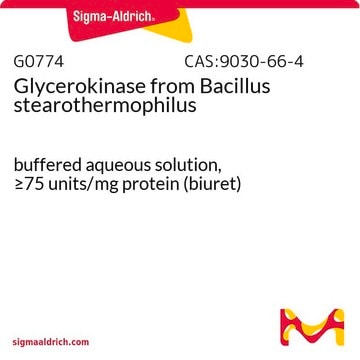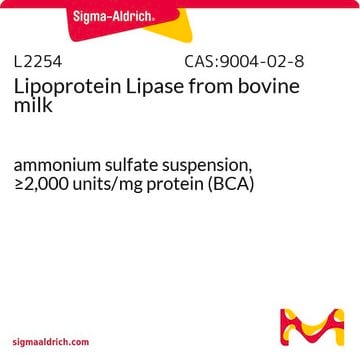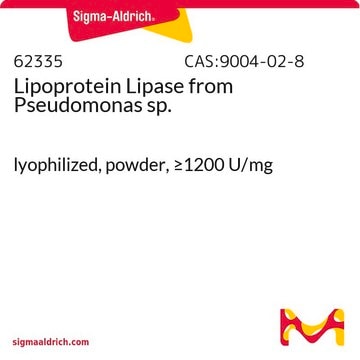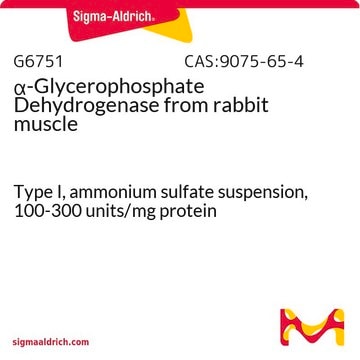G9888
Glycerol 3-phosphate Oxidase from Aerococcus viridans
lyophilized powder, ≥70 units/mg solid
Synonym(s):
sn-Glycerol 3-phosphate:oxygen 2-oxidoreductase, L-Glycerol 3-phosphate Oxidase, GPO
Sign Into View Organizational & Contract Pricing
All Photos(1)
About This Item
Recommended Products
form
lyophilized powder
specific activity
≥70 units/mg solid
composition
Protein, ≥60% Lowry
storage temp.
−20°C
Looking for similar products? Visit Product Comparison Guide
Unit Definition
One unit will oxidize 1.0 μmole of L-glycerol 3-phosphate to dihydroxyacetone phosphate with the formation of H2O2 per min at 37°C, at pH 8.1.
Physical form
Lyophilized powder containing sucrose
Signal Word
Danger
Hazard Statements
Precautionary Statements
Hazard Classifications
Resp. Sens. 1
Storage Class Code
11 - Combustible Solids
WGK
WGK 3
Flash Point(F)
Not applicable
Flash Point(C)
Not applicable
Personal Protective Equipment
dust mask type N95 (US), Eyeshields, Gloves
Certificates of Analysis (COA)
Search for Certificates of Analysis (COA) by entering the products Lot/Batch Number. Lot and Batch Numbers can be found on a product’s label following the words ‘Lot’ or ‘Batch’.
Already Own This Product?
Find documentation for the products that you have recently purchased in the Document Library.
Customers Also Viewed
Albert Premkumar et al.
Physiologia plantarum, 167(1), 90-110 (2018-11-13)
Hypoxia (oxygen deprivation) causes metabolic disturbances at physiological, biochemical and genetic levels and results in decreased plant growth and development. Phospholipase D (PLD)-mediated signaling was reported for abiotic and biotic stress signaling events in plants. To investigate the participatory role
Alain Bizzini et al.
Journal of bacteriology, 192(3), 779-785 (2009-12-08)
Enterococcus faecalis is equipped with two pathways of glycerol dissimilation. Glycerol can either first be phosphorylated by glycerol kinase and then oxidized by glycerol-3-phosphate oxidase (the glpK pathway) or first be oxidized by glycerol dehydrogenase and then phosphorylated by dihydroxyacetone
Tatsuya Kishimoto et al.
Clinica chimica acta; international journal of clinical chemistry, 333(1), 59-67 (2003-06-18)
Several methods for measuring concentrations of lysophosphatidic acid (LPA), a lipid mediator, have been reported to date. However, these methods are not routinely used because most of them require specialized instrument and a complicated protocol. We developed a novel LPA
C S Pundir et al.
Clinical biochemistry, 43(4-5), 467-472 (2009-12-29)
A method is described for construction of an amperometric triglyceride (TG) biosensor using PVA membrane bound enzymes. A mixture of commercial lipase, glycerol kinase, glycerol-3-phosphate oxidase and horseradish peroxidase was co-immobilized onto polyvinyl alcohol (PVA) membrane through glutaraldehyde coupling. The
Shu-Yi Hsu et al.
Sensors (Basel, Switzerland), 10(6), 5758-5773 (2010-01-01)
A single use, disposable iridium-nano particle contained biosensor had been developed for the determination of diglyceride (DG). In this study hydrogen peroxide, formed through the enzymatic breakdown of DG via lipase, glycerol kinase and glycerol 3-phosphate oxidase, was electrochemically oxidized
Our team of scientists has experience in all areas of research including Life Science, Material Science, Chemical Synthesis, Chromatography, Analytical and many others.
Contact Technical Service
